Coconut Oil For Teeth Whitening: 5 DIY Remedies That Work
Time to bid goodbye to stubborn yellow teeth that don’t bring anything but embarrassment.
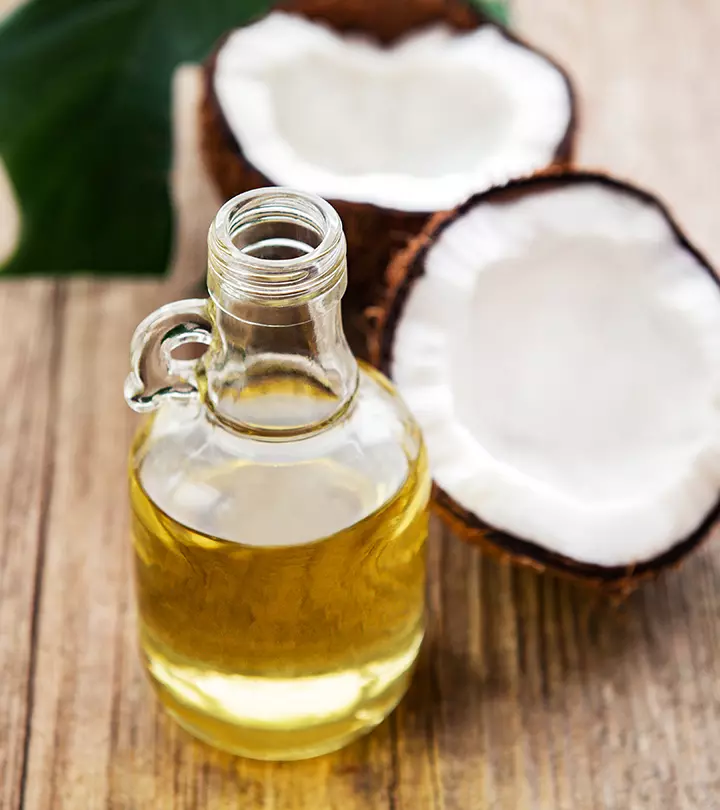
Image: Shutterstock
Coconut oil is commonly used in natural remedies and beauty products. The internet has also simultaneously promoted the humble oil, and the recent trend has indeed gone viral, with everyone using coconut oil for teeth whitening. Coconut oil has antimicrobial, anti-inflammatory, and antioxidant properties and may help maintain oral hygiene. But the primary question remains, does it truly aid teeth whitening as it claims, or can it be labeled an apparent myth? Let’s dive into how coconut oil can support teeth whitening and if the ongoing craze has any factual backing. Keep reading.
In This Article
Does Coconut Oil Whiten Teeth?
Despite having antimicrobial and antioxidant properties, coconut oil (Cocos nucifera L.) doesn’t carry any brightening benefits that can directly contribute to teeth whitening.
While no clear study has proven its effectiveness in whitening stained teeth, research does support coconut oil’s efficacy in reducing plaque buildup and tackling oral problems like gingivitis (1).
Let’s get familiar with this super oil’s various oral benefits.
Key Takeaways
- Coconut oil may not whiten teeth when used alone.
- Mixing coconut oil with other ingredients like turmeric powder or baking soda may aid in teeth whitening.
- It may treat common gum conditions like gingivitis (gum swelling), plaque buildup, tooth decay, and bad breath.
- Coconut oil has antimicrobial, antibacterial, and anti-inflammatory properties that support and improve oral hygiene.
Benefits Of Coconut Oil For Teeth
1. May Prevent Tooth Decay
Coconut oil helps kill common oral bacteria, like Streptococcus mutans, that are the lead cause of cavities and tooth decay (2), (3).
2. May Reduce Oral Odor
Coconut oil contains lauric acid, which is responsible for its antimicrobial properties. This saturated fat may aid in preventing the growth of Helicobacter pylori, the bacteria that contribute to halitosis (bad breath) (4).
3. May Treat Gingivitis
Coconut oil may treat gingivitis, a gum disease that causes inflammation and irritation in the gums and can even result in tooth loss in severe cases (1).
4. May Reduce Plaque Buildup And Tooth Sensitivity
The fatty acids in coconut oil exhibit antimicrobial and antibacterial properties that eliminate oral bacteria in the mouth and prevent plaque formation (5). Reduced plaque buildup may also help prevent tooth sensitivity.
AnnaCris, a blogger, shared a positive update on her experience with coconut oil for teeth whitening. She also emphasized its use through a practice called “oil pulling,” stating, “I’ve noticed a huge difference and it is consistent. So if you oil pull for 3-5 days straight, you will see a noticeable difference and needless to say, that if you keep going (if your teeth are really yellow) you will see that your teeth are a shade whiter than when you started.” She also writes about her sensitive teeth, noting, “When I oil pull, the sensitivity does go away (i).”
Using coconut oil can give you healthier gums and teeth. And you can use it with other ingredients to whiten your teeth. Surprised? Keep reading to learn ways to use coconut oil for teeth whitening.
How To Use Coconut Oil For Teeth Whitening
1. Coconut Oil And Baking Soda
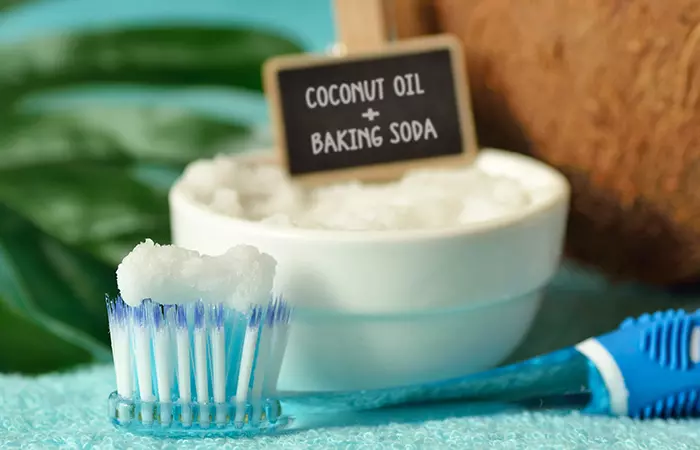
Baking soda is alkaline and can help lighten the appearance of acid-based food stains, like the ones from tea, coffee, and red wine. This quick remedy may also effectively kill oral bacteria in the mouth (6).
What You Need
- 1 tablespoon of coconut oil
- 1 tablespoon of baking soda
- 1 toothbrush
What To Do
- Mix coconut oil and baking soda.
- Brush your teeth with the mixture for 3-4 minutes.
- Rinse with tepid water.
- Follow the procedure twice a week for visible results.
 Quick Tip
Quick Tip2. Coconut Oil Pulling
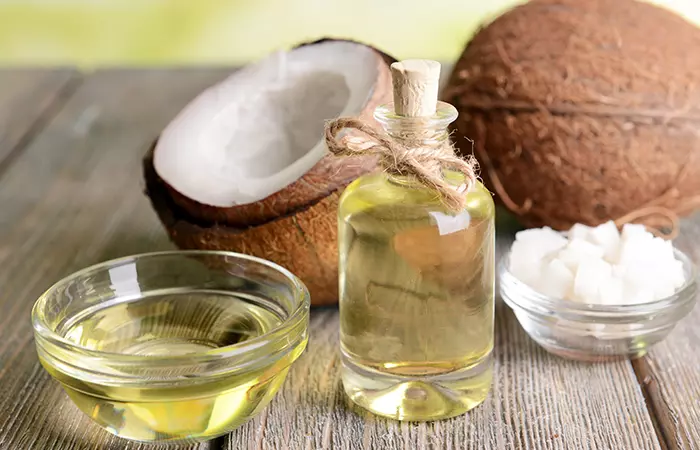
Oil pulling benefits the teeth and gums by reducing harmful bacteria and preventing bad breath. Using coconut oil for oil pulling has specific benefits. It contains lauric acid that targets oral bacteria that cause stubborn yellow plaque buildup in the mouth (7). This ancient Ayurvedic technique can prevent bacteria accumulation and help maintain dental hygiene.
What You Need
- 1 tablespoon of coconut oil
- 1 toothbrush
What To Do
- Put coconut oil in your mouth and wait a few seconds for it to melt.
- Swish the oil around for 15 to 20 minutes.
- Spit out the oil and brush your teeth.
- Repeat this process once daily or weekly.
3. Coconut Oil And Turmeric
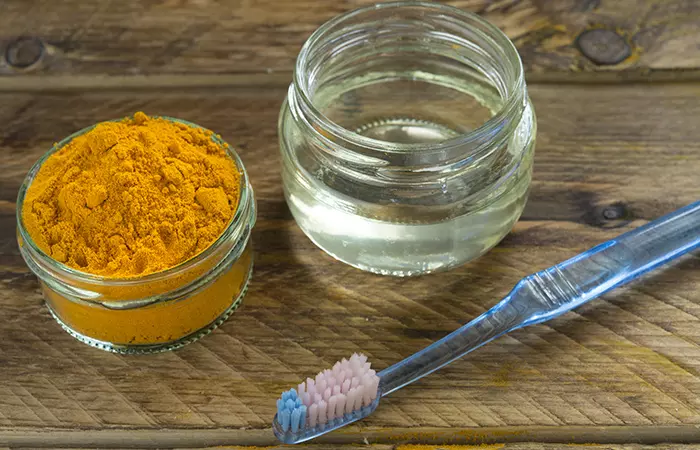
Turmeric contains curcumin, a natural compound that reduces inflammation, removes plaque, and helps prevent gum diseases like gingivitis (8).
What You Need
- ¼ teaspoon of organic turmeric powder
- ⅛ teaspoon of coconut oil
- 1 toothbrush
- 1 tube of regular toothpaste
What To Do
- Mix turmeric powder and coconut oil.
- Apply the mixture onto your teeth and leave it on for three minutes.
- Gently brush and rinse off the paste with water.
- Finally, brush your teeth with regular toothpaste.
- Follow the procedure 1-2 times a week.
 Quick Tip
Quick Tip4. Coconut Oil And Activated Charcoal
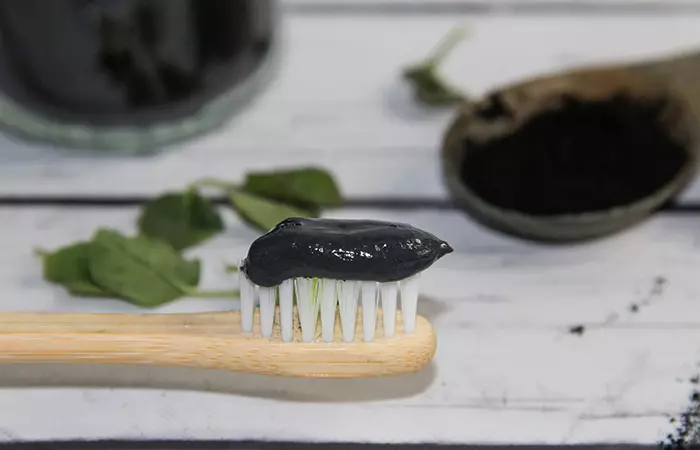
Brushing with activated charcoal may help clear stains from the teeth. The remedy also works on the dental resin used for filling cavities (9).
What You Need
- 1 tablespoon of powdered charcoal tablet
- 1 tablespoon of coconut oil
- 1 toothbrush
What To Do
- Apply activated charcoal powder on a damp toothbrush and brush your teeth with it.
- Do this for 2 to 3 minutes before rinsing your gums and teeth with coconut oil.
- Rinse off with lukewarm water.
- Follow the procedure once a week.
Note:
Excessive use of activated charcoal may damage dental fillers. So ensure not to use it frequently.
 Quick Tip
Quick Tip5. Coconut Oil Mouthwash
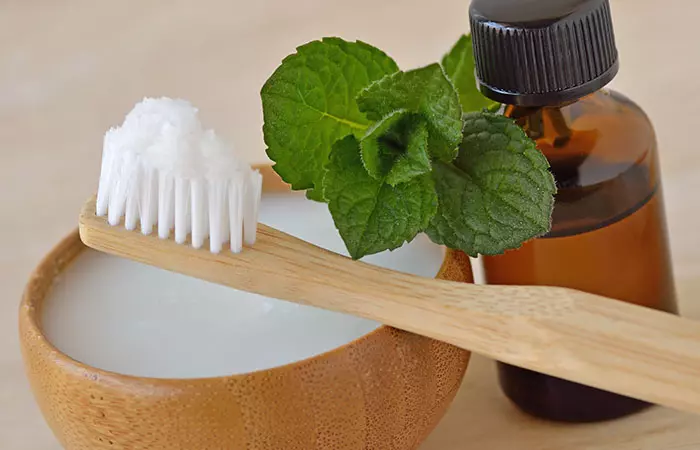
Peppermint oil has antimicrobial properties that may help fight against oral pathogens. It may also freshen your breath, enhance your palate, and brighten your teeth (10), (11).
What You Need
- 1 cup of coconut oil
- 2 tablespoons of baking soda
- 5 drops of peppermint essential oil
- 1 tablespoon of sea salt
- A glass jar
What To Do
- Mix the coconut oil, baking soda, and peppermint essential oil in a bowl.
- Combine them well and stir in the sea salt.
- Transfer it to a glass jar with a tight-fitting lid.
- Store the mixture in a cool place for 5 minutes.
- Wait until it solidifies.
- You can brush your teeth with this mixture (if it is solid) or swish it around in your mouth and spit it out (if it is melted).
Not everybody can benefit from coconut oil, so let’s have a quick look at its possible side effects and who should avoid it.
Who Should Not Use Coconut Oil For Teeth Whitening
Coconut oil isn’t harmful and doesn’t cause any side effects. However, if you are allergic to coconut oil or experience any sensitivity or inflammation during oil pulling, stop using it immediately. Coconut oil pulling is also not suggested for people with weak jaw muscles as the tedious task can tire out the muscles further.
Coconut oil pulling, a natural teeth-whitening approach, is just one of the many methods available. Let’s explore some other options.
Alternatives To Coconut Oil For Teeth Whitening
Charcoal Toothpaste: This product has gained popularity for its ability to absorb stains and whiten teeth. However, caution is required as it is abrasive, and excessive use may lead to enamel erosion.
Whitening Strips: These strips, another common option, contain bleaching agents that can significantly whiten teeth. While effective, they can sometimes irritate gums and may not be suitable for sensitive teeth.
Professional Teeth Whitening: For those seeking the most effective and controlled approach, professional teeth whitening treatments performed by dentists should be your way ahead. These treatments involve applying high-concentration bleaching agents under professional supervision, ensuring safety and optimal results.
Infographic: 4 DIY Coconut Oil Remedies For Teeth Whitening
Although coconut oil is known to the masses for its beautifying benefits, the idea of entering the oral category still attracts skeptical eyes and doubts. The latest rave is about coconut oil’s numerous benefits for our oral health, specifically whitening teeth. If you are keen on trying the oil but are unsure how to incorporate it into your everyday dental care routine, check out the infographic below for easy DIY recommendations.
Some thing wrong with infographic shortcode. please verify shortcode syntaxFinal Thoughts
Coconut oil has been one of the top reigning oils in most Indian homes, owing to its multiple health and beauty benefits. However, it is also a great component to incorporate into your daily routine — especially coconut oil pulling, a beneficial Ayurvedic practice to indulge in. It is touted as an effective ingredient to whiten your teeth naturally and improve overall oral health. Coconut oil may help prevent cavities, plaque, and gingivitis. While it may not whiten the teeth if used alone, it works well with other ingredients and may help remove teeth stains. However, do an allergy test before using coconut oil and other ingredients to avoid complications.
Frequently Asked Questions
How long does it take for coconut oil pulling to whiten teeth?
With regular practice of coconut oil pulling for one to two months, you can witness some improvement in your teeth’ color.
Is olive oil better than coconut oil for teeth whitening?
Anecdotal evidence suggests that coconut oil, in comparison with olive oil as a teeth whitening treatment, displayed better results and also showed less plaque buildup and gum inflammation post-oil pulling.
Can I apply coconut oil to my teeth overnight?
Yes. You can do oil pulling any night and leave the oil applied to your teeth overnight. It can help reduce plaque formation and soothe sensitive gums.
Can coconut oil replace brushing my teeth?
While coconut oil helps nourish, protect, and strengthen the teeth and gums, it can not be a replacement for brushing. Flossing and brushing your teeth daily removes food particles stuck between your teeth and avoids cavities.
Can I use any type of coconut oil for teeth whitening?
You can use cold-pressed or extra-virgin coconut oil to help in teeth whitening.
Is it safe to swallow coconut oil while using it for teeth whitening?
No, do not swallow coconut oil as it is full of bacteria and may cause diarrhea or stomach upset. Consult your dentist to understand the right and safe way to go about it.
Illustration: Coconut Oil For Teeth Whitening: Benefits And How To Use It
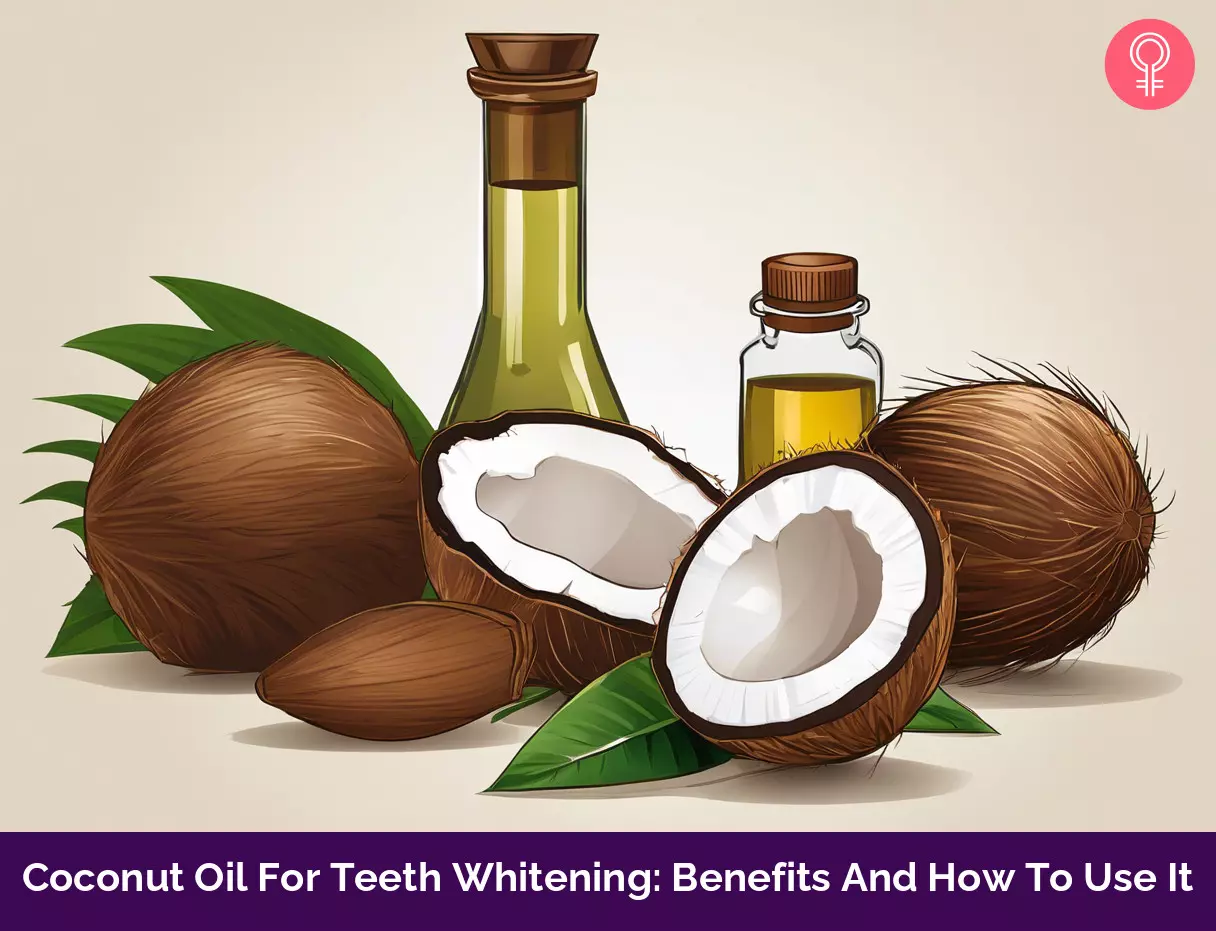
Image: Stable Diffusion/StyleCraze Design Team
Learn how to whiten your teeth with coconut oil. Check out this video to get brighter teeth in no time while also getting rid of bad odor and improving your oral health.
Personal Experience: Source
StyleCraze's articles are interwoven with authentic personal narratives that provide depth and resonance to our content. Below are the sources of the personal accounts referenced in this article.
i. My experience with coconut oil and argan oilhttps://annacrisblogs.wordpress.com/2015/11/21/my-experience-with-coconut-oil-and-argan-oil/
References
Articles on StyleCraze are backed by verified information from peer-reviewed and academic research papers, reputed organizations, research institutions, and medical associations to ensure accuracy and relevance. Read our editorial policy to learn more.
- Effect of coconut oil in plaque related gingivitis – A preliminary report
https://pubmed.ncbi.nlm.nih.gov/25838632/ - The Effect of Coconut Oil pulling on Streptococcus mutans Count in Saliva in Comparison with Chlorhexidine Mouthwash
https://pubmed.ncbi.nlm.nih.gov/27084861/ - Streptococcus mutans, Caries and Simulation Models
https://www.ncbi.nlm.nih.gov/pmc/articles/PMC3257652/ - Oil pulling and importance of traditional medicine in oral health maintenance
https://www.ncbi.nlm.nih.gov/pmc/articles/PMC5654187/ - Short- and medium-chain fatty acids exhibit antimicrobial activity for oral microorganisms
https://www.ncbi.nlm.nih.gov/pmc/articles/PMC3119748/ - Stain removal and whitening by baking soda dentifrice: A review of literature
https://pubmed.ncbi.nlm.nih.gov/29056186/ - Oil pulling for maintaining oral hygiene – A review
https://www.ncbi.nlm.nih.gov/pmc/articles/PMC5198813/ - The Effects of Curcumin in the Treatment of Gingivitis: A Systematic Review of Clinical Trials
https://pubmed.ncbi.nlm.nih.gov/34331691/ - Efficiency of activated charcoal powder in stain removal and effect on surface
https://www.ncbi.nlm.nih.gov/pmc/articles/PMC8665222/ - Antimicrobial efficacy of five essential oils against oral pathogens: An in vitro study
https://www.ncbi.nlm.nih.gov/pmc/articles/PMC4054083/ - PEPPERMINT OIL, ITS USEFUL, AND ADVERSE EFFECTS ON HUMAN HEALTH: A REVIEW
https://www.researchgate.net/publication/347034154_PEPPERMINT_OIL_ITS_USEFUL_AND_ADVERSE_EFFECTS_ON_HUMAN_HEALTH_A_REVIEW
Read full bio of Dr. Anjali Asok
Read full bio of Aparna Mallampalli
Read full bio of Arshiya Syeda
Read full bio of Payal Karnik







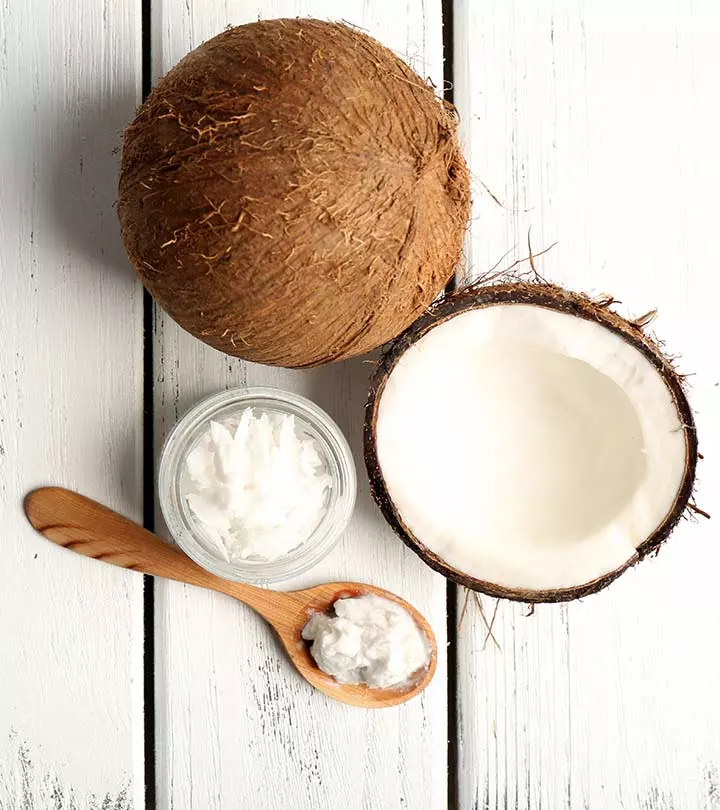

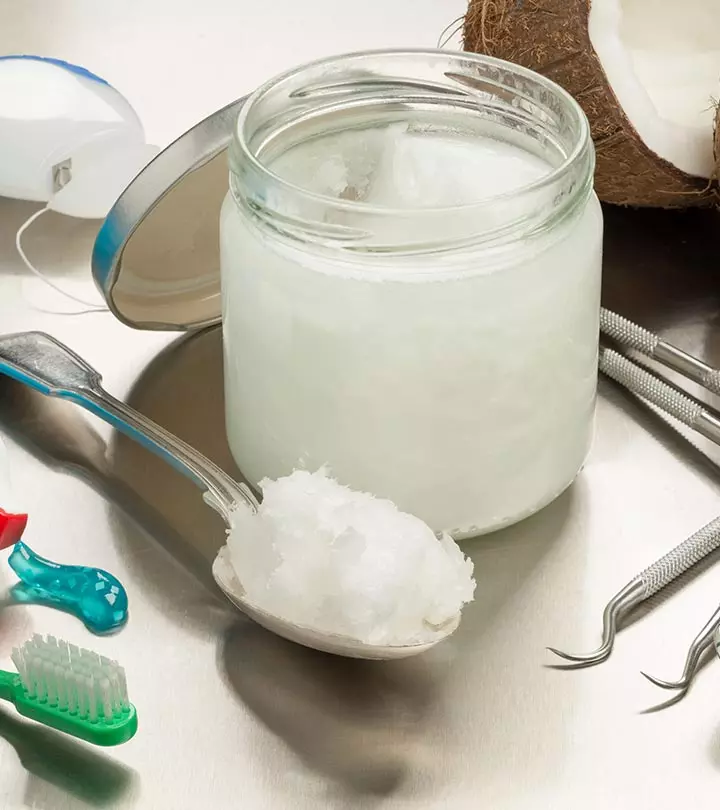
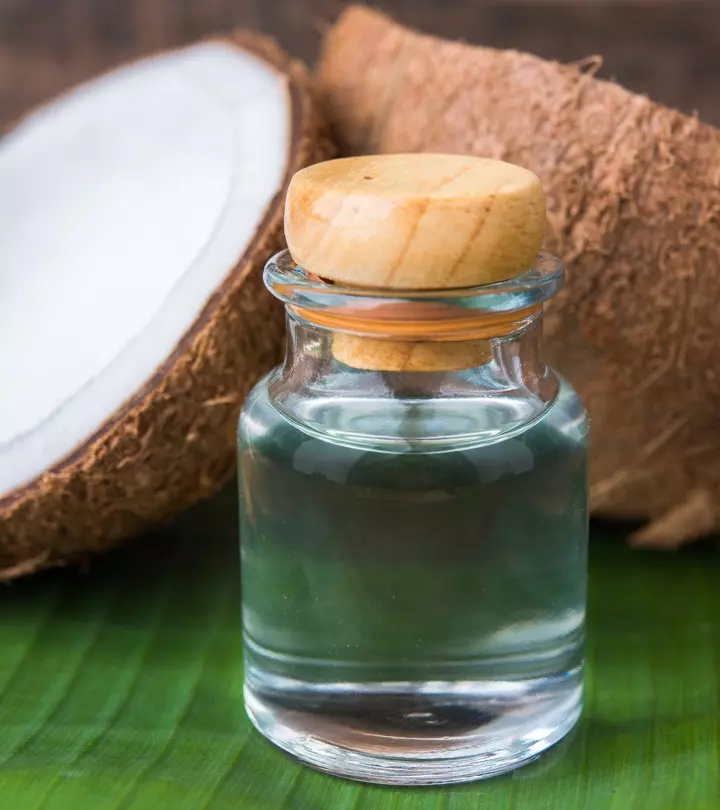
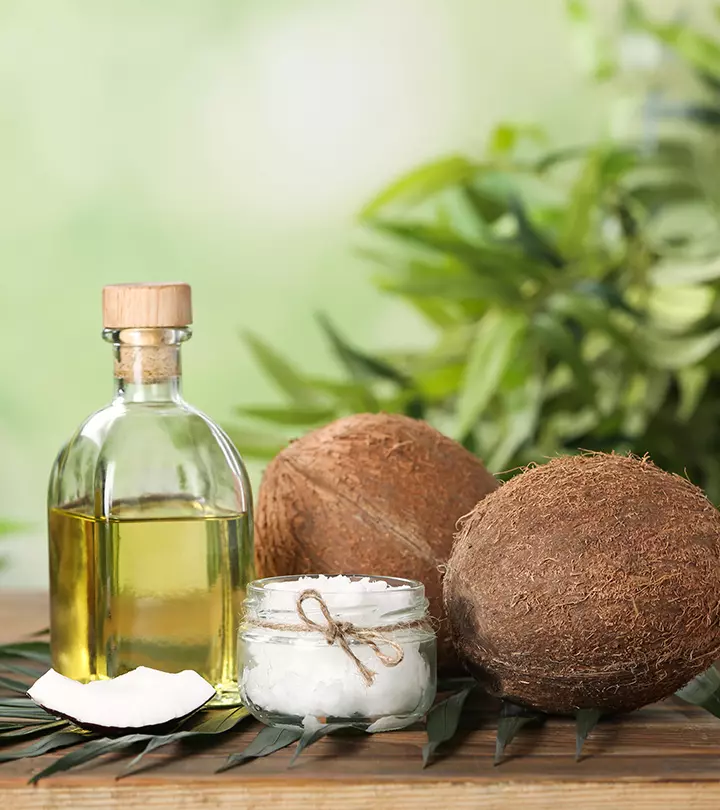













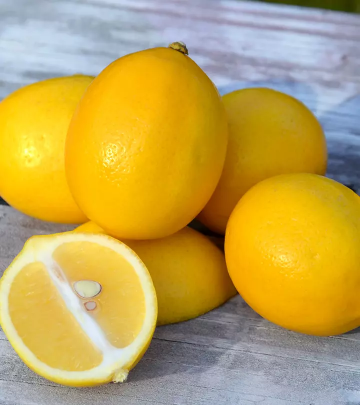

Community Experiences
Join the conversation and become a part of our empowering community! Share your stories, experiences, and insights to connect with other beauty, lifestyle, and health enthusiasts.